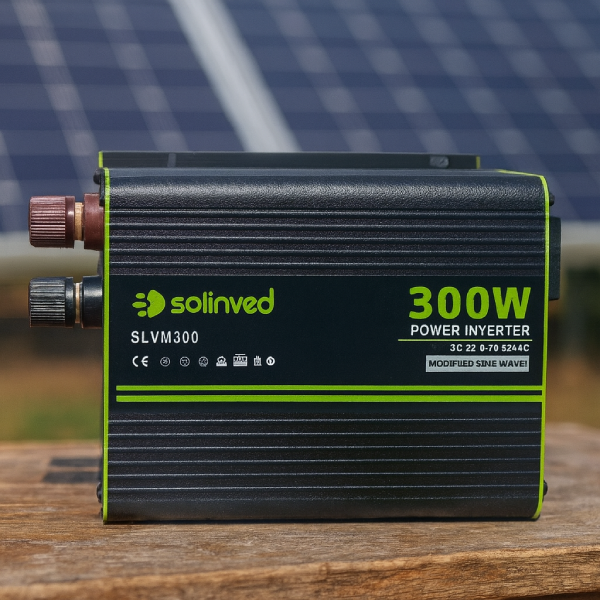


A power inverter, one of the most important components of solar energy systems, converts direct current (DC) electricity generated from solar panels into alternating current (AC) used in homes and businesses. These devices act not only as energy converters but also as the brain of the system.
Solinved, with its domestic engineering expertise, offers maximum performance and safety in energy conversion with its highly efficient power inverter solutions. In this article, we will examine in detail the types of power inverters, their areas of use, and the factors affecting their prices.
A power inverter is a device that converts electrical current. The energy produced by solar panels is in the form of DC (direct current), but household electrical appliances operate on AC (alternating current). By enabling this conversion, an inverter enables the use of solar energy in daily life.
In addition, inverters optimize energy production, communicate with the grid, manage battery charge, and ensure system security. Therefore, choosing the right inverter is crucial for both energy efficiency and system life.
Power inverters are manufactured in different types based on their operating principles and system structures.
Solinved aims to maximize users' energy efficiency by offering inverter solutions suitable for every need.
These inverters are used in grid-connected systems. They convert the energy generated from solar panels into AC, meeting both indoor consumption and transferring excess energy to the grid.
Advantages:
Provides uninterrupted power by relying on grid power.
Allows for the sale of excess energy.
Offers high conversion efficiency.
Solinved On-Grid Inverters:
Equipped with high-efficiency MPPT technology, they are suitable for industrial and residential systems with grid synchronization, remote monitoring, and safe shutdown features.
Used in areas without electrical infrastructure. These inverters manage the energy generated from solar panels and batteries, creating a completely independent system.
Advantages:
Provides uninterrupted power in areas without grid power.
Ideal for agricultural irrigation systems, rural settlements, and camping sites.
Battery integration allows for nighttime power use.
Solinved Off-Grid Inverters:
Fully compatible with high-discharge lithium batteries. They offer high efficiency in agricultural irrigation and remote energy solutions.
Hybrid inverters are advanced devices capable of operating both grid-tied and battery-backed. These systems optimize solar energy production while storing excess energy in batteries.
Advantages:
Intelligently manages solar energy, batteries, and the grid.
Provides uninterrupted power during power outages.
Can be used in both residential and commercial applications.
Solinved Hybrid Inverters:
Automatically optimize the balance of production, storage, and consumption with intelligent energy management algorithms. With remote monitoring support and high conversion efficiency, they form the basis of Solinved hybrid systems.
These are next-generation inverters. Unlike traditional inverters, they analyze energy flow and can digitally balance production and consumption.
Advantages:
Remote control and monitoring capabilities.
High efficiency (up to 98%).
Real-time data recording and reporting.
Solinved Smart Inverters:
Developed with an IoT (Internet of Things)-based infrastructure, the Solinved Smart series supports smart energy management. It has a wide range of applications, from residential systems to industrial facilities.
System Type (On-Grid, Off-Grid, Hybrid): Inverter selection should be determined based on the system's operating structure.
Power Capacity: Inverter power should be equal to or slightly above the panel capacity.
MPPT (Maximum Power Point Tracking): This technology ensures panels operate at maximum efficiency.
Efficiency Ratio: Inverters with high conversion efficiency reduce energy loss.
Warranty and Technical Support: Solinved offers domestic production and technical service support for all inverter series.
Power inverter prices vary depending on many technical factors beyond brand and model. Solinved offers quality solutions with inverter options to suit every budget and need.
1. Inverter Type: On-grid inverters are generally more affordable, while hybrid inverters are more expensive due to their advanced energy management features.
2. Power Capacity (kW): The price increases as the inverter's power increases. The 3–10 kW range is generally preferred for residential systems, while the 50–100 kW range is preferred for industrial systems.
3. Technology and Efficiency: Smart inverters and hybrid models are more expensive because they include advanced MPPT control, remote monitoring, and battery management systems.
4. Battery Compatibility: Some inverter models do not support direct battery connection. Battery-compatible hybrid inverters may be more expensive but offer the advantage of energy storage.
5. Warranty and Service: Solinved inverters offer users economical and safe operation with their long warranty, domestic production advantage, and extensive technical support network.
Energy conversion efficiency up to 98%
Maximum production with MPPT technology
Automatic power management between grid, battery, and solar energy
Intelligent temperature control and protection circuits
Remote monitoring and data logging support
Quiet, durable, and IP-protected design
Locally manufactured and 24/7 technical support
Solinved inverter solutions have a wide range of applications:
Residential solar energy systems
Commercial facilities
Agricultural irrigation systems
Electric vehicle charging stations
Off-grid living spaces
Industrial energy management
Inverter power and type are determined based on each system's needs. The Solinved engineering team ensures the right product selection for the project.
Solinved focuses not only on energy conversion but also on energy management in its inverter production. Its inverters optimize the entire energy flow from panels to batteries, from the grid to consumption points.
With its domestically produced power, engineering support, and high-efficiency products, Solinved is a trusted brand in energy conversion. Choosing the right inverter for projects of all sizes increases both energy efficiency and return on investment in the long term.
1. What is a power inverter?
It is a device that converts DC electricity from solar panels to AC.
2. What is the difference between on-grid and off-grid inverters?
On-grid inverters operate connected to the grid, while off-grid systems are completely independent.
3. What is the advantage of a hybrid inverter?
Hybrid systems can operate both grid-connected and battery-powered, providing backup power during power outages.
4. How do power inverter prices vary?
Capacity, technology, inverter type, and brand quality are the primary factors affecting price.
5. What is the warranty period for Solinved inverters?
Solinved inverters offer the advantage of a long warranty and local technical support.